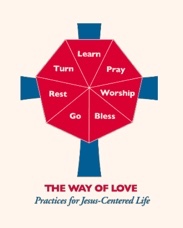Our congregation bought a little church building with a cupola but no bell and no apparent way to install one or ring it. It's been a matter of ongoing discussion. A member who lives nearby wants to hear a church bell. There are none in town. Another is appalled at the notion of an electronic solution. A third repeats the architectural difficulties.
And then - the way these things happen - an out of town member who can attend the Advent study group because it's on Zoom said I've got a bell.
And a spouse with a history of not being particularly supportive was waiting in the truck outside the building, looking the place over, and said, This church needs a bell. But... Oh I know how to get that bell to ring.
So, what will this bell ring?
It will ring faith - The faithfulness of a people who, when our voices get old and our way uncertain, still persist in the faith that God has a purpose for us. The faithfulness of a God who makes us ever new and keeps sending us forth.
It will ring hope - The endurance born of hardship, the experience that builds character - We do not fade. We know that God is waiting for us in the darkest night.
It will ring love - When the virus closed the doors of the building, it opened new ways for us to love our neighbors. And love is contagious, too, just as contagious as the virus. Others have joined us in new ministries.
Our mission statement is born of love: We, being in love with Christ, are ministers of God's love. We are called to share that love by caring for one another and reaching out to all. Our bell will ring love.
And it will ring joy.
Joy to the world, my friends! Joy to all.
























